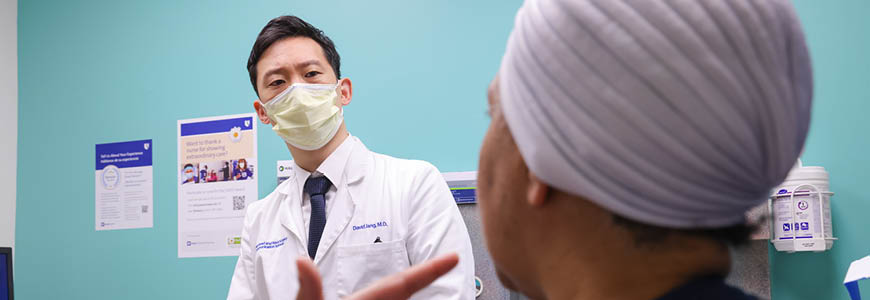Many patients whose symptoms continue after sinus or nasal surgery can benefit from a referral to Duke for further evaluation and treatment, according to David W. Jang, MD, a head and neck surgeon and sinus specialist at Duke.
Most patients see their condition improve after a single surgery, but for 10 to 15 percent, symptoms persist because of problems such as resistant bacteria in the sinuses, recurring polyps, or too much scar tissue.
“The most common reason patients need additional surgery is they have severe disease that doesn’t improve with conventional surgery,” Jang says. “If a sinus continues to be infected or blocked by scar tissue, or a patient has medical problems that might contribute to sinus inflammation, their doctor should consider a referral because we have a lot of resources and specialists at Duke to help us manage that type of patient.”
“Revision surgery is much more complex than conventional surgery, and Duke sinus surgeons have specialized training in it,” Jang says. “More than half of the surgeries we do are revisions.”
Revisions can be challenging because they are generally more extensive and must deal with the scar tissue left by previous surgery. In addition, the most common sinus needing revision is the frontal sinus, which is narrow and close to the brain. “We are taking high-speed drills and working close to critical structures like the eyes and brain. Often regular ENT doctors are not comfortable doing a revision because it is definitely higher risk,” Jang says.
In addition to the surgeons’ training, as a regional referral center, Duke offers equipment and treatments not generally available. These include the highest-resolution video endoscopy equipment along with stereotactic computer navigation for precise surgery to minimize trauma. Other minimally invasive technologies include curved micro-instruments and drug-eluting implants.
Another advantage Duke offers is multidisciplinary care. In addition to ENT and sinus specialists, the team can include anesthesiologists, allergists, pulmonologists, speech and voice therapists, and other specialists required by a particular case.
This multidisciplinary approach is especially beneficial to patients with additional challenges such as autoimmune disease, immune system deficiencies, or bad asthma. For example, a pulmonologist can make sure that a patient with asthma is optimized for surgery by ensuring that the asthma is under good control with the right medications. Anesthesiologists at Duke are also highly experienced with patients who have complex medical problems.
Jang said that all these factors reflect a commitment to ensuring their patients’ long-term quality of life.
